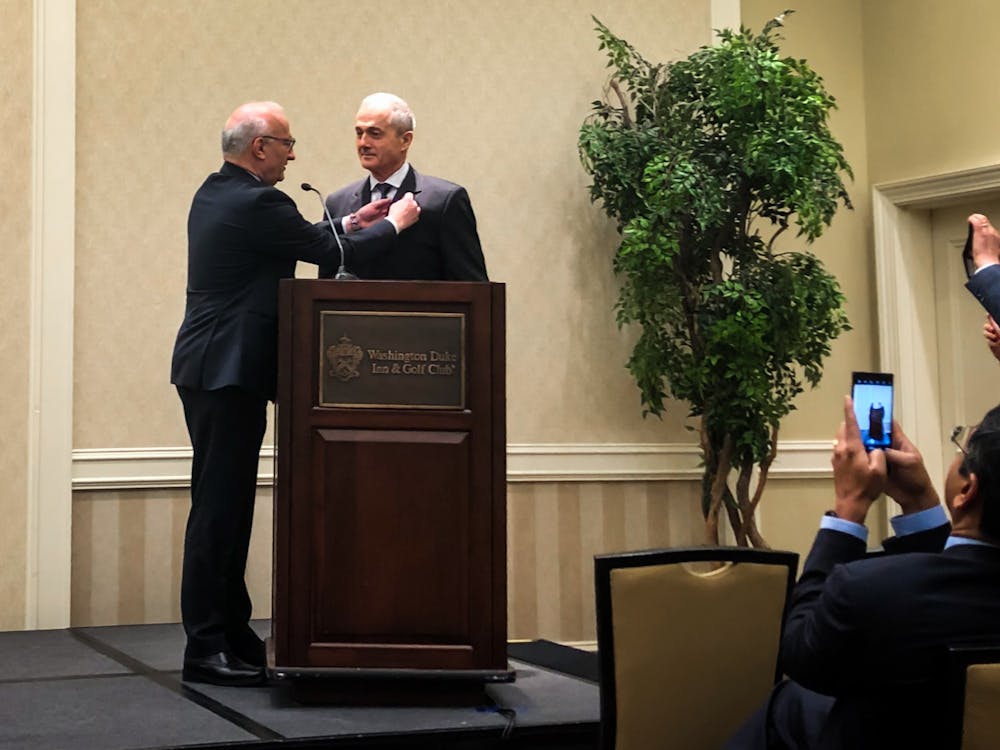If you’ve ever wondered if you should call your professor “Dr.” or “Prof.,” you might now need to consider whether to call them “Knight.”
At a Washington Duke Inn event Thursday, Philippe Étienne, the French ambassador to the United States, bestowed Adrian Bejan, J.A. Jones distinguished professor of mechanical engineering, with the honor of Knight of the French Order of Academic Palms, an award bestowed by the French government for accomplishments in culture and education.
“This ceremony cannot possibly contain enough hours to mention the remarkable number of your publications and awards,” Étienne said.
Étienne, a diplomatic advisor to French president Emmanuel Macron, noted that Bejan has published 30 books and more than 650 peer-reviewed articles, and has received 18 honorary doctorates from universities in 11 countries—including two in France.
The ambassador cited Bejan’s “interdisciplinary pioneering and contributions in modern thermodynamics,” as well as his development of the constructal law, a concept that describes the process of evolution in physical systems, as important accomplishments. He praised Bejan’s collaboration with Sylvie Lorente, an adjunct professor of mechanical engineering and materials science at Duke who received the French Order of Academic Palms in 2008.
Étienne added he was “moved” to be able to talk to Bejan in the professor’s native language of Romanian, and he made part of his speech in that language. Étienne served as ambassador extraordinary and plenipotentiary in Bucharest, Romania from 2002 to 2005.
“I have the deepest respect for the contributions the French have made to Europe, America and Western civilization,” Bejan said in a speech after accepting the award.
He lauded the the ideas that French mathematicians and scientists have made to engineering, from thermodynamics to applied mathematics.
President Vincent Price gave a short speech introducing Étienne, in which he praised the history of diplomacy between France and the United States. He also congratulated Bejan on his honor.
“Not many Blue Devils can call themselves ‘Knight,’” the president said, drawing chuckles from the small audience that had gathered in the Washington Duke’s Forest Room for the event.
Before the knighthood ceremony, Étienne discussed European politics and global issues before the ceremony in a conversation with Georg Vanberg, professor of political science and law and chair of the department of political science. The ambassador stressed the “common challenges” that the United States and the European Union face in the future, from climate change to the rise of new world powers.
Vanberg asked the ambassador about the state of the European Union after the United Kingdom’s recent departure from the bloc. Étienne lamented the choice to leave, but he called it “the decision of the British people” and said it is important to settle on future relations in trade, migration and other areas.
He went into detail on security, noting that France will continue to cooperate with the United Kingdom as a member of NATO, as a member of the European Union and in bilateral relations.
“France and the U.K. actually have a very strong collaboration, a bilateral collaboration, in the field of defense,” he said.
He also stressed the need for an active European Union defense policy, not to replace NATO but to “reinforce it, by reinforcing its European pillar.”
It is important for democratic nations to remember their values in the face of global issues, Étienne said.
“We must never forget that we are democracies,” he emphasized.
Get The Chronicle straight to your inbox
Signup for our weekly newsletter. Cancel at any time.
Matthew Griffin was editor-in-chief of The Chronicle's 116th volume.

